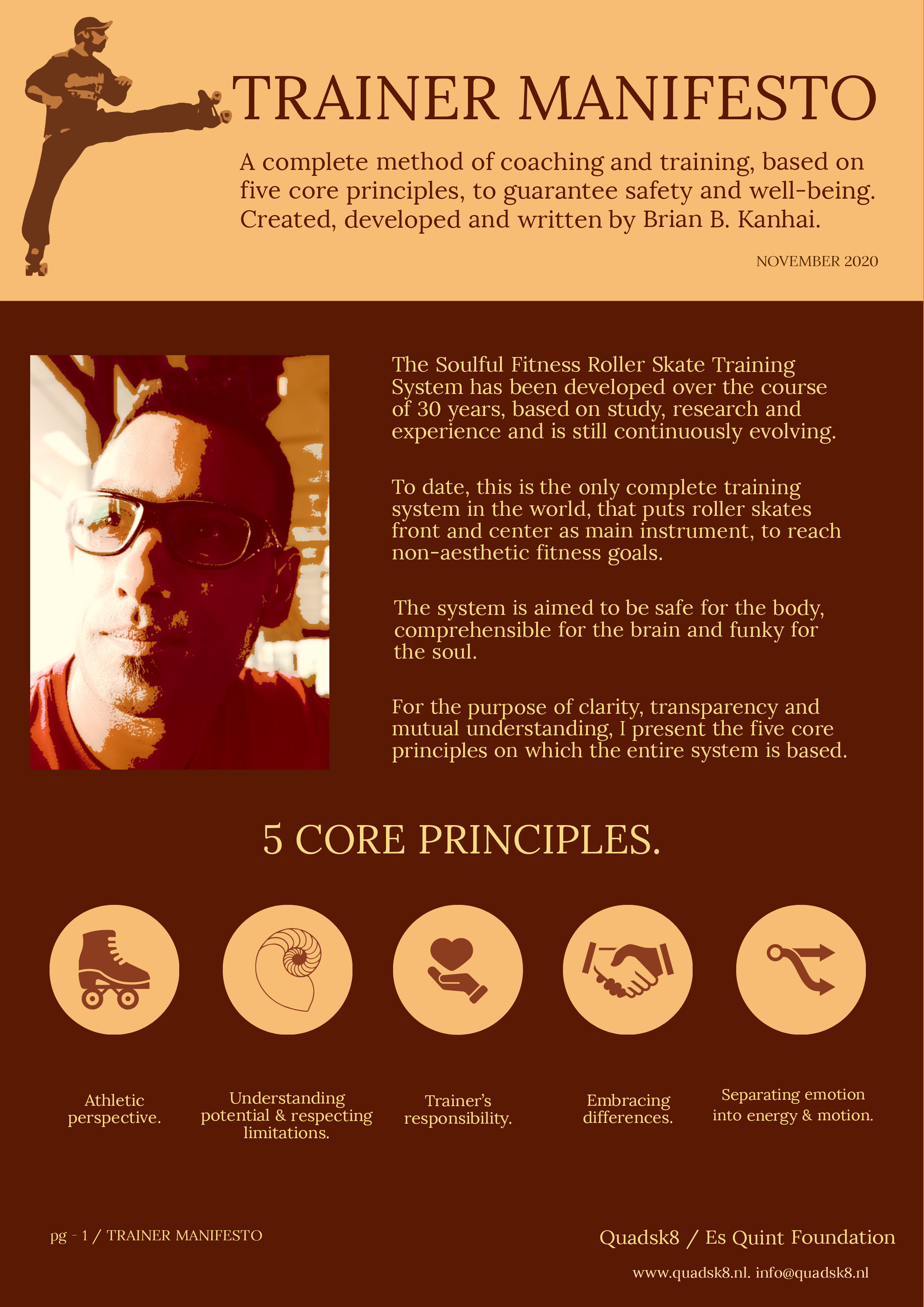Trainer Manifesto
Geplaatst op 10-11-2020
With the explosion (d.d. May 2020) of social media content regarding a plethoric availability of `How-To-Do-Videos` in some format or the other, people can copy, emulate and/or redefine just about anything that grabs their attention. The internet has become the number one source of inspiration, ideas and attention, but unfortunately also a lot of misinformation.
The most important aspect of working with people, is the absolute necessity of a clear mutual understanding of goals and expectations. This, to avoid bad results, disappointments and misunderstanding.
Therefore, with utmost carefulness, I have detailed my frame of thoughts, developed from years of education, research and practical experience.
I also refer to this frame, as my personalized trainer manifesto and is first and foremost about guaranteeing the trainee’s safety, health and well-being under any and all circumstances.
This manifesto represents the spirit in which I operate in the capacity of roller skate trainer and make decisions as such, based on evidence and experience.
TRAINER MANIFESTO V.1.0 November 2020.
- Athletic perspective.
One could easily say that labeling roller skating as a physical activity, is stating the obvious. But surprisingly enough, this little yet important and indeed very obvious detail is vastly overlooked and underestimated. Roller skating works the body, mind and soul. An athletic perspective is instrumental for the purpose of safety and training efficacy. To limit the chance of sustaining injuries, methodically learned basic roller skating skills are extremely important before getting into any differentiation, be it dance, sports or just plain and simple distance rolling and street skating.
- Understanding potential and respecting limitations.
Especially when it comes to roller skating, I don’t see good or bad/wrong; I only see differences. Drawing a figure 6 from one side of a table, usually means that it looks different and has a different interpretation to the person sitting across the table.
Someone else doing something in another way, with another reason with a different outcome, doesn’t make it necessarily wrong. It’s just different. There is only one exception to this personal rule though: the potential and limitations of the human body; injury is a clear sign of a bad decision or a streak of wrongful doing; not establishing a fluent flow, means something in the process is not connecting well. Injury is never an acceptable result, under any circumstance.
- Trainer’s responsibility.
Telling or showing somebody else what to do with their body and how to do it, is an extremely responsible task. This, for one reason and one reason only: people can get hurt, meaning seriously hurt. One little misstep can cause serious injury, too many times resulting in irreversible damage with life changing consequences. The highly repetitive nature of roller skating accumulates the chance of sustaining injuries (acute or chronic), due to neglecting proper form and/or questionable given instructions. Any and every instruction should never be nothing less than impeccable.
- Embracing differences.
What works for one particular person doesn’t necessarily work the same way (or at all) for another person and vice versa. There can be physical differences and limitations due to old/fresh injuries and pre-existing conditions for instance. So it is very important to not generalize and provide options in what is shared, so people can pick what works best for them and adapt to personal specifications. It is good to have commonalities and strengthen them. It is even better to have differences and consolidate them. That makes each of us unique and strive to evolve.
- Separating emotion into energy and motion.
Free flow dance has a strong emotional component, if not completely driven by it. When you take the emotional energy out of the equation, what you’re left with is just the motion, the posture and /or the pattern of movement. Distinguishing emotion from the biomechanics is extremely important, when dealing with people who are insecure about their bodily appearance and/or the way they move. This insecurity can be a not to be underestimated blockage to efficient skill development and growth of self-confidence and thus giving free way and play to any emotional content being anchored as physiopsychological inhibition. By learning people how to properly use their body, it can emotionally help them to connect or re-connect with it, more genuinely.
----------
Apart from this personal set of five principles, I adhere to common consensus on what is regarded high standards in provision of services.
Therefore, in the capacity of roller skate trainer,
- I always act with compassion and integrity, respecting the rights, well-being and dignity of those I interact with.
- I never do any medical claims, advices or diagnoses, but make appropriate referrals to licensed professionals for assessment, treatment and guidance.
- Although I have my personal preferences, I do not endorse or advice any brand or company for personal gain. This, to guarantee and uphold my total independence and avoid any conflicts of interest.
- I do however, always intend to support and endorse people who contribute to the community in any positive and productive way.
Brian B. Kanhai.



